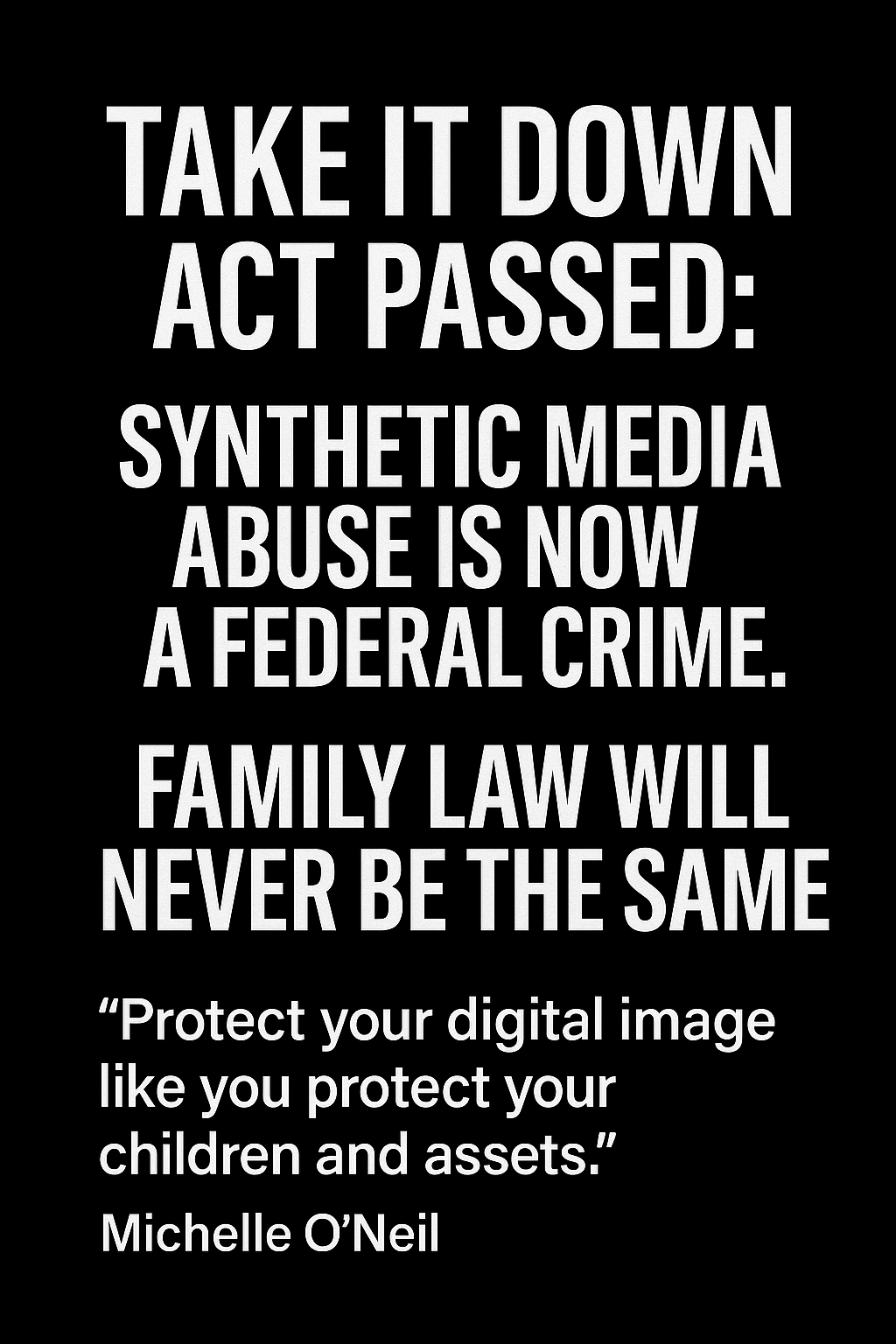Yesterday, in a rare moment of bipartisan agreement, Congress passed the TAKE IT DOWN Act — a groundbreaking piece of legislation that makes the non-consensual sharing of synthetic and intimate imagery a federal crime. The bill, which passed the House with an overwhelming 409–2 vote and previously cleared the Senate unanimously, is now on its way to President Trump’s desk for signature.
This law could not come at a more critical moment — and it has major implications for those navigating divorce, custody disputes, and family law litigation.

What Is the TAKE IT DOWN Act?
The TAKE IT DOWN Act (S.146) creates a clear federal remedy for survivors of non-consensual intimate imagery (NCII) — whether real or digitally altered. This includes AI-generated pornography, deepfake nudes, and other forms of synthetic media abuse.
The law criminalizes knowingly sharing or threatening to share such content without consent. It also compels platforms and websites to remove flagged content within 48 hours of a verified request.
Key provisions include:
- Criminal penalties of up to 2 years for adult-targeted offenses, and up to 3 years if the victim is a minor.
- Platform accountability — with mandated removal of content and all duplicates within 48 hours.
- First Amendment protection for legitimate journalism and artistic expression.
- Carve-outs for law enforcement and medical professionals acting in good faith.
The bill was co-sponsored by Senators Amy Klobuchar (D-MN) and Ted Cruz (R-TX), showcasing bipartisan concern about the rise of synthetic media weaponization.
The Hidden Epidemic: How Synthetic Media Harms Women
While deepfakes may sound like sci-fi, they’re already wreaking havoc in real people’s lives — especially women’s.
Startling statistics include:
- 98% of all deepfake content online is pornographic.
- 99% of victims of deepfake pornography are women.
- Female politicians are 70x more likely than men to be targeted by synthetic porn attacks.
- 1 in 8 teens say they know someone who’s been victimized by AI-generated explicit content.
- A 2023 study showed a 550% increase in deepfake video volume between 2019 and 2023.
How This Law Affects Divorce and Custody Cases
As a family law attorney, I’ve seen firsthand how technology is increasingly weaponized during high-conflict litigation. The TAKE IT DOWN Act brings welcome clarity and protection to these vulnerable scenarios.
Here’s how it matters in a family law setting:
- Emergency Relief: The law provides a fast track to seek removal and protection when synthetic media is being used to harass, threaten, or defame a party in a divorce or custody case.
- Custody Impacts: Judges may now weigh deepfake exploitation as evidence of coercive control or unfit parenting, especially where children are endangered or used as pawns.
- Reputational Harm & Coercion: Non-consensual AI content can devastate reputations — and this law gives victims leverage in civil and financial negotiations.
- Evidence Strategy: Attorneys can now demand forensic authentication of suspicious digital “evidence” and challenge its admissibility.
Download My Free Tip Sheet: 10 Tips to Protect Yourself Against Deepfake Evidence
I’ve created a free downloadable guide with actionable tips for litigants who want to safeguard their digital identity before and during a family law case.
Click here to download your free guide.
Final Thought
As the law catches up to technology, it’s up to us — as lawyers, parents, and citizens — to stay informed and proactive. The TAKE IT DOWN Act is a crucial step forward, especially for women and families navigating high-stakes legal battles.

